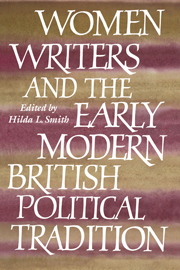Book contents
- Frontmatter
- Contents
- List of contributors
- Preface
- Introduction: Women, intellect, and politics: their intersection in seventeenth-century England
- Part I Women's political writings, 1400–1690
- Part II Women's political and philosophical writings, 1690–1800
- Part III The intellectual context and economic setting for early modern women
- Part IV Early modern legal and political prescriptions for women
- Conclusion: women's writing, women's standing: theory and politics in the early modern period
- Index
Preface
Published online by Cambridge University Press: 04 August 2010
- Frontmatter
- Contents
- List of contributors
- Preface
- Introduction: Women, intellect, and politics: their intersection in seventeenth-century England
- Part I Women's political writings, 1400–1690
- Part II Women's political and philosophical writings, 1690–1800
- Part III The intellectual context and economic setting for early modern women
- Part IV Early modern legal and political prescriptions for women
- Conclusion: women's writing, women's standing: theory and politics in the early modern period
- Index
Summary
This collection emerged from a conference sponsored by the Center for the History of British Political Thought of the Folger Shakespeare Library on Political Women/Political Writings: Early Modern Britain in a European Context, held May 25–26, 1995. It is structured around the interdependent relationship between women's political writings and the intellectual and social institutions that determined their acceptance or dismissal. It focuses on the political ideas of a range of women authors who were more familiar to, but seldom fully accepted by, their contemporaries than they have become to those studying early modern politics and political thought. It is also comparative by design in order to focus on similar, but distinct, arguments offered in differing geographic settings both by women authors concerning women's political standing, and particular political values and customs that helped determined women's public role. It also seeks to move beyond a focus in which political realities and ideas are held constant, and the issue addressed is simply the integration of women into an accepted norm. The arguments of women writers, the political and intellectual institutions of place and period, regional differences, and evolving political and social norms are each considered problematic rather than normative; and the essays in this volume focus on the shifting interactions among them.
Acknowledgments
The conference on Political Writings/Political Women was held through the generous sponsorship of the Folger Institute, and I want to thank Lena Orlin, then Institute director, in particular, for her support.
- Type
- Chapter
- Information
- Women Writers and the Early Modern British Political Tradition , pp. xiii - xivPublisher: Cambridge University PressPrint publication year: 1998

